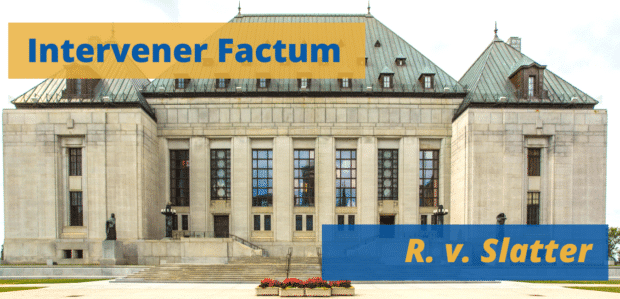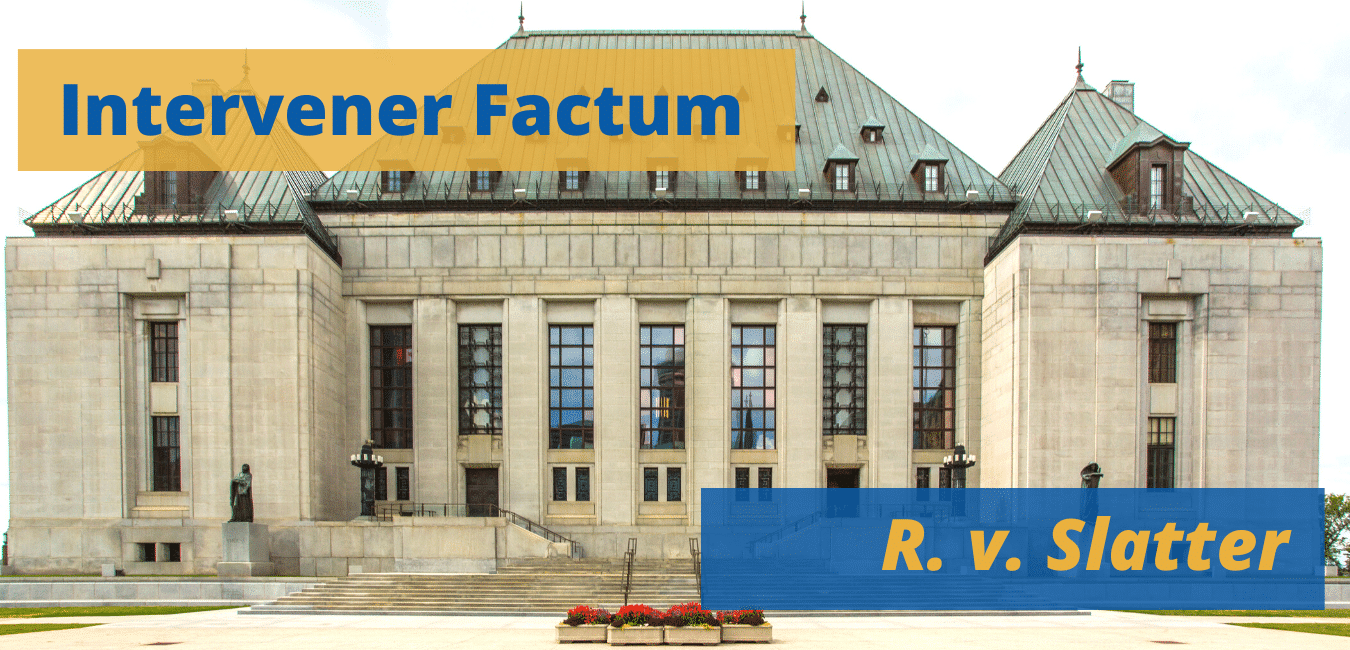
On July 27, 2020, a coalition of leading equality organizations: LEAF, DisAbled Women’s Network Canada (“DAWN”), and ARCH Disability Law Centre (“ARCH”) delivered their written submissions to the Supreme Court of Canada in R. v. Slatter. The coalition’s submissions identify the negative implications of the decision of the majority of the Ontario Court of Appeal for women with labelled with intellectual disabilities seeking equal access to justice in the criminal justice system. LEAF-DAWN-ARCH argue that the majority’s decision erects new barriers for women labelled with intellectual disabilities by a more onerous standard for the assessment of a complainant’s reliability when she is labelled with an intellectual disability. This may result in women with disabilities facing more onerous reliability assessments simply because of generalizations and stereotypes about their disability.
Background of the case
This case involves a woman labelled with an intellectual disability who disclosed sexual assault. At trial, defence counsel argued that the complainant’s evidence was unreliable, because her disability made her suggestible (as in, her answers were easily influenced by others). The trial judge did not accept these submissions, and convicted the accused of sexually assaulting the complainant.
The accused appealed to the Court of Appeal and argued, in part, that the judge had failed to adequately explain why he found the complainant reliable. The majority of the Ontario Court of Appeal overturned the conviction and ordered a new trial, finding that the judge’s reasons were not sufficient. In particular, the majority focused on the expert report from the trial that discussed the complainant’s suggestibility, in relation to that of the general population, and held that the trial judge failed to adequately address the issue of the complainant’s reliability and suggestibility in his reasons.
In dissent, Justice Pepall would have dismissed the appeal. She found that, when the trial judge’s reasons were read in the context of the entire record, including the evidentiary record, the live issues at trial, and the lawyers’ submissions, it was clear that the trial judge was alive to the issue of reliability, but did not accept the generalized concerns about the complainant’s suggestibility. Drawing on the well accepted jurisprudence concerning the sufficiency of reasons, she found the reasons in this case were entirely adequate.
LEAF-DAWN-ARCH’s argument
LEAF-DAWN-ARCH argue that a substantive equality analysis requires the Court to make assessments based on the actual abilities and individual circumstances of women with disabilities (such as their ability to describe what happened), as opposed to generalizations about disabilities.
The majority of the Court of Appeal focused on the medical expert’s general opinion over the trial judge’s individualized assessment of the complainant’s evidence. By preferring the expert’s generalized evidence over the complainant’s testimony, the majority’s approach could require trial judges in future cases to address the suggestibility of a complainant labelled with an intellectual disability, even if there is no evidence of the complainant being suggestible during their interaction with law enforcement when they report, or at trial.
The coalition’s intervention provides the Supreme Court with an intersectional equality analysis of the case under appeal. LEAF-DAWN-ARCH submit that the majority decision of the Court of Appeal creates an additional barrier to access to justice for women labelled with intellectual disabilities by reinforcing harmful stereotypes about them:
Read LEAF-DAWN-ARCH’s factum for further details here.
Quotes
“LEAF welcomes the opportunity to join forces with DAWN and ARCH to ensure the Supreme Court of Canada understands the broader implications of the majority decision of the Court of Appeal. Women labelled with intellectual disabilities are disproportionately subjected to sexual violence and already face significant hurdles in accessing justice. The majority decision, if left to stand, could impose yet another barrier to justice by way of a more onerous reliability assessment rooted in generalizations and stereotypes”, Megan Stephens – Executive Director and General Counsel at LEAF
“We are witnessing a massive erosion of substantive equality rights for people with disabilities that we have witnessed in the context of this pandemic with health policy makers and health professionals triaging resources in a way that negatively impacts women with disabilities. This intervention to the Supreme Court is important to protect focus on the actual capacities of a woman, not an expert’s idea of it. When the courts side with the ‘experts’ and not the rights-holder we are down the wrong side of the slippery slope”, Bonnie Brayton – National Executive Director at DAWN
“LEAF-DAWN-ARCH’s intervention highlights the importance of ensuring that appellate courts review trial judges’ decisions in a way that promotes substantive equality and access to justice for sexual assault complainants labelled with intellectual disabilities. Having ratified the Convention on the Elimination of all Forms of Discrimination against Women and the Convention on the Rights of Persons with Disabilities, Canada has international obligations to ensure that judgments are not based upon harmful stereotypes and generalizations, and do not create barriers to justice for women labelled with intellectual disabilities”, Robert Lattanzio – Executive Director at ARCH
Case committee and Counsel
LEAF-DAWN-ARCH’s arguments were informed and supported by a case committee composed of academics and practitioners with expertise in the relevant issues. The committee members for this intervention are (in alphabetical order): Shelley Fletcher (People First of Canada), Karine-Myrgianie Jean-François (DAWN), Barb McIntyre (Boost Child & Youth Advocacy Centre), Janet Mosher (Osgoode Hall Law School), Roxanne Mykitiuk (Osgoode Hall Law School), and Tess Sheldon (Faculty of Law, University of Windsor).
For background and judicial history of the case, see our earlier announcements when LEAF-DAWN-ARCH applied for leave to intervene and when leave was granted by the Supreme Court of Canada.
Hearing
The hearing for this case is tentatively scheduled for November 6, 2020.
About Women’s Legal Education and Action Fund (LEAF)
The Women’s Legal Education and Action Fund (LEAF) works to advance the substantive equality rights of women and girls through litigation, law reform, and public education. Since 1985, LEAF has intervened in landmark cases that have advanced equality in Canada—helping to prevent violence, eliminate discrimination in the workplace, provide better maternity benefits, ensure a right to pay equity, and allow access to reproductive freedoms.
To support our work to protect the equality rights of women and girls, please consider donating today.
About DisAbled Women’s Network Canada (DAWN)
Established in 1985, DAWN is a national, feminist, cross-disability organization that has provided opportunities for self-determination and leadership development for women and girls with disabilities for 35 years. DAWN’s mission is to end the poverty, isolation, discrimination and violence experienced by Canadian women with disabilities and Deaf women. DAWN works towards the advancement and inclusion of women and girls with disabilities and Deaf women and girls by creating change at a systemic level. DAWN has intervened before the Supreme Court of Canada on its own, or in coalition with LEAF, in numerous criminal and human rights-related cases.
About ARCH Disability Law Centre (ARCH)
ARCH is a specialty legal clinic, with a 40-year history of defending and advancing the equality rights and inclusion of persons with disabilities. ARCH is governed by a community-based board of directors, the majority of whom are persons with disabilities. ARCH provides legal advice directly to persons with disabilities in Ontario, conducts test case litigation before all levels of courts and tribunals, and maintains an extensive law reform practice. ARCH has particular expertise in human rights law, equality rights law and access to justice for persons with disabilities.
For media inquiries, contact:
Suzan E. Fraser
Fraser Advocacy
T : 416 703 9555
E : [email protected]
Kerri Joffe, Staff Lawyer
ARCH Disability Law Centre
E: [email protected]
Rosel Kim, Staff Lawyer
Women’s Legal Education and Action Fund
E: [email protected]

